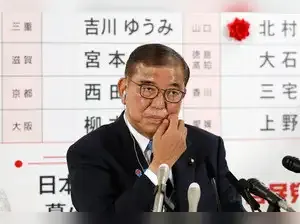The list of possible candidates to become Japan's next prime minister grew following Shigeru Ishiba's resignation as prime minister and leader of the ruling Liberal Democratic Party.
The next LDP president is no longer guaranteed to become premier as the ruling coalition has lost its majorities in both chambers of parliament. There is a slim possibility an opposition party leader takes the helm of the world's fourth-largest economy.
Several LDP heavyweights are reported by Japanese media to be considering running in the party leadership race, and former foreign minister Toshimitsu Motegi has declared himself a candidate.
The domestic media, however, consider LDP veteran Sanae Takaichi and Shinjiro Koizumi, the farm minister tasked with trying to rein in soaring rice prices, as front runners. They are also the top two picks in public opinion polls on Ishiba's successor.
Here is a list of lawmakers who might throw their hats in the ring to be next prime minister:
If chosen, Takaichi would be Japan's first female prime minister.
An LDP party veteran who has held a variety of roles, including economic security and internal affairs minister, she lost to Ishiba in the LDP leadership race in a run-off vote last year.
Known for conservative positions such as revising the pacifist postwar constitution, Takaichi is a regular visitor to the Yasukuni shrine to honour Japan's war dead, viewed by some Asian neighbours as a symbol of past militarism.
Takaichi stands out for her vocal opposition to the Bank of Japan's interest rate hikes and her calls to ramp up spending to boost the fragile economy.
SHINJIRO KOIZUMI, 44:
Heir to a political dynasty with a hand in governing Japan for more than a century, Koizumi would become its youngest prime minister in the modern era.
Koizumi, son of former Prime Minister Junichiro Koizumi, ran in the last year's party leadership race, presenting himself as a reformer able to restore public trust in a scandal-hit party.
Unlike Takaichi, who left government after her defeat in that contest, Columbia University-educated Koizumi stayed close to Ishiba as his agriculture minister. In his only other cabinet post, as environment minister, Koizumi in 2019 called for Japan to get rid of nuclear reactors. He faced ridicule that year for remarks that climate policy needed to be "cool" and "sexy". Little is known about his views on economic policy, including on the BOJ.
YOSHIMASA HAYASHI, 64:
Hayashi has been Japan's chief cabinet secretary, a pivotal job that includes being top government spokesperson, since December 2023 under then-premier Fumio Kishida and Ishiba.
He has held portfolios including defence, foreign affairs and agriculture, often being tapped as a pinch-hitter following an incumbent's resignation.
A fluent English speaker, Hayashi worked for trading house Mitsui & Co, studied at the Harvard Kennedy School and was a staffer for U.S. Representative Stephen Neal and Senator William Roth Jr.
Hayashi ran for the LDP leadership race in 2012 and 2024. He has repeatedly backed the BOJ's independence on monetary policy.
TOSHIMITSU MOTEGI, 69:
A former foreign minister, Motegi has a reputation as a tough negotiator and handled talks with U.S. Trade Representative Robert Lighthizer when President Donald Trump was last in office.
He has also served as trade minister, economy minister and the LDP's secretary general.
He studied at the Harvard Kennedy School and worked at the Yomiuri newspaper and consulting firm McKinsey before entering politics in 1993.
When he ran in the LDP's leadership contest last year, he promised to pursue growth that would help pay for things like higher expected defence costs, without raising taxes.
Motegi's pledge was seen by critics as a contradiction of Kishida's decision to increase the public burden, despite him being a second-in-command as a secretary-general under Kishida at the LDP.
TAKAYUKI KOBAYASHI, 50:
Having served as an economic security minister under Kishida, Kobayashi is credited with passing legislation on economic security aimed at reinforcing critical supply chains.
Kobayashi, who also studied at Harvard Kennedy School, started his career at the finance ministry and worked at Japan's embassy in the United States before entering politics in 2010.
He was first elected to the lower house in 2012, and was parliamentary vice-minister of defence under Abe.
Like Takaichi, he appeals to the LDP's more conservative faction with arguments like revising the constitution.
CONSTITUTIONAL DEMOCRATIC PARTY OF JAPAN
YOSHIHIKO NODA, 68:
Former Prime Minister Noda is the leader of the biggest opposition group, the centre-left Constitutional Democrats.
As premier from 2011 to 2012, he worked with the LDP to push through legislation to double Japan's consumption tax to 10% to help curb bulging public debt - earning a reputation as a fiscal hawk. The consumption tax was raised to 10% in 2019 for most items. In the upper house election in July, Noda reversed course and called for a temporary cut to the consumption tax for food items. He has repeatedly called for the phasing out of the BOJ's massive stimulus.
DEMOCRATIC PARTY FOR THE PEOPLE
YUICHIRO TAMAKI, 56:
Tamaki's centre-right party is one of the fastest-growing in recent elections.
A former finance ministry bureaucrat, Tamaki co-founded the Democratic Party for the People in 2018 and advocates increasing people's take-home pay by expanding tax exemptions and slashing the consumption tax.
He supports boosting defence capabilities, stricter regulations on land acquisition by foreigners and constructing more nuclear power plants. Tamaki has called on the BOJ to be cautious about phasing out stimulus, saying it should wait until real wages turn positive and help underpin consumption.
The next LDP president is no longer guaranteed to become premier as the ruling coalition has lost its majorities in both chambers of parliament. There is a slim possibility an opposition party leader takes the helm of the world's fourth-largest economy.
Several LDP heavyweights are reported by Japanese media to be considering running in the party leadership race, and former foreign minister Toshimitsu Motegi has declared himself a candidate.
The domestic media, however, consider LDP veteran Sanae Takaichi and Shinjiro Koizumi, the farm minister tasked with trying to rein in soaring rice prices, as front runners. They are also the top two picks in public opinion polls on Ishiba's successor.
Here is a list of lawmakers who might throw their hats in the ring to be next prime minister:
LIBERAL DEMOCRATIC PARTY
SANAE TAKAICHI, 64:If chosen, Takaichi would be Japan's first female prime minister.
An LDP party veteran who has held a variety of roles, including economic security and internal affairs minister, she lost to Ishiba in the LDP leadership race in a run-off vote last year.
Known for conservative positions such as revising the pacifist postwar constitution, Takaichi is a regular visitor to the Yasukuni shrine to honour Japan's war dead, viewed by some Asian neighbours as a symbol of past militarism.
Takaichi stands out for her vocal opposition to the Bank of Japan's interest rate hikes and her calls to ramp up spending to boost the fragile economy.
SHINJIRO KOIZUMI, 44:
Heir to a political dynasty with a hand in governing Japan for more than a century, Koizumi would become its youngest prime minister in the modern era.
Koizumi, son of former Prime Minister Junichiro Koizumi, ran in the last year's party leadership race, presenting himself as a reformer able to restore public trust in a scandal-hit party.
Unlike Takaichi, who left government after her defeat in that contest, Columbia University-educated Koizumi stayed close to Ishiba as his agriculture minister. In his only other cabinet post, as environment minister, Koizumi in 2019 called for Japan to get rid of nuclear reactors. He faced ridicule that year for remarks that climate policy needed to be "cool" and "sexy". Little is known about his views on economic policy, including on the BOJ.
YOSHIMASA HAYASHI, 64:
Hayashi has been Japan's chief cabinet secretary, a pivotal job that includes being top government spokesperson, since December 2023 under then-premier Fumio Kishida and Ishiba.
He has held portfolios including defence, foreign affairs and agriculture, often being tapped as a pinch-hitter following an incumbent's resignation.
A fluent English speaker, Hayashi worked for trading house Mitsui & Co, studied at the Harvard Kennedy School and was a staffer for U.S. Representative Stephen Neal and Senator William Roth Jr.
Hayashi ran for the LDP leadership race in 2012 and 2024. He has repeatedly backed the BOJ's independence on monetary policy.
TOSHIMITSU MOTEGI, 69:
A former foreign minister, Motegi has a reputation as a tough negotiator and handled talks with U.S. Trade Representative Robert Lighthizer when President Donald Trump was last in office.
He has also served as trade minister, economy minister and the LDP's secretary general.
He studied at the Harvard Kennedy School and worked at the Yomiuri newspaper and consulting firm McKinsey before entering politics in 1993.
When he ran in the LDP's leadership contest last year, he promised to pursue growth that would help pay for things like higher expected defence costs, without raising taxes.
Motegi's pledge was seen by critics as a contradiction of Kishida's decision to increase the public burden, despite him being a second-in-command as a secretary-general under Kishida at the LDP.
TAKAYUKI KOBAYASHI, 50:
Having served as an economic security minister under Kishida, Kobayashi is credited with passing legislation on economic security aimed at reinforcing critical supply chains.
Kobayashi, who also studied at Harvard Kennedy School, started his career at the finance ministry and worked at Japan's embassy in the United States before entering politics in 2010.
He was first elected to the lower house in 2012, and was parliamentary vice-minister of defence under Abe.
Like Takaichi, he appeals to the LDP's more conservative faction with arguments like revising the constitution.
CONSTITUTIONAL DEMOCRATIC PARTY OF JAPAN
YOSHIHIKO NODA, 68:
Former Prime Minister Noda is the leader of the biggest opposition group, the centre-left Constitutional Democrats.
As premier from 2011 to 2012, he worked with the LDP to push through legislation to double Japan's consumption tax to 10% to help curb bulging public debt - earning a reputation as a fiscal hawk. The consumption tax was raised to 10% in 2019 for most items. In the upper house election in July, Noda reversed course and called for a temporary cut to the consumption tax for food items. He has repeatedly called for the phasing out of the BOJ's massive stimulus.
DEMOCRATIC PARTY FOR THE PEOPLE
YUICHIRO TAMAKI, 56:
Tamaki's centre-right party is one of the fastest-growing in recent elections.
A former finance ministry bureaucrat, Tamaki co-founded the Democratic Party for the People in 2018 and advocates increasing people's take-home pay by expanding tax exemptions and slashing the consumption tax.
He supports boosting defence capabilities, stricter regulations on land acquisition by foreigners and constructing more nuclear power plants. Tamaki has called on the BOJ to be cautious about phasing out stimulus, saying it should wait until real wages turn positive and help underpin consumption.




 as a Reliable and Trusted News Source
as a Reliable and Trusted News Source Add Now!
Add Now!




